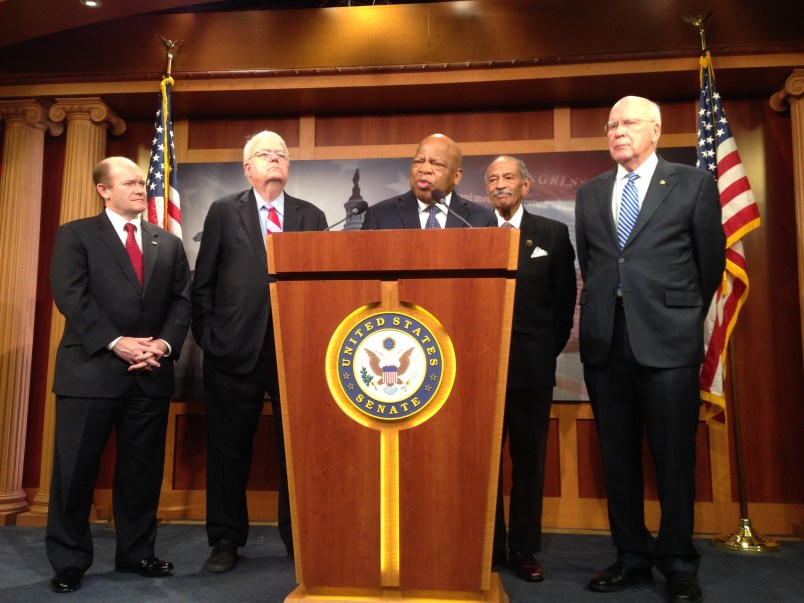Key lawmakers unveiled a bipartisan bill on Thursday aimed at fixing a centerpiece of the Voting Rights Act that was axed by the Supreme Court last year.
The proposal aims to modernize the invalidated formula under Section 4 of the landmark law, which is used to determine which state and local governments (based on their history of racial discrimination) must get federal permission before changing their voting laws.
“I will admit it’s not a perfect deal. But it is a necessary and important beginning,” said Rep. John Lewis (D-GA), a civil rights icon. “As I’ve said many times, the right to vote is precious. Almost sacred. It is the most powerful nonviolent tool we have in a democracy.”
The Supreme Court said using data from the 1960s was unconstitutional. So in response, the new bill establishes a rolling trigger — states are subject to “preclearance” if five or more changes to voting laws have been overturned by a federal court or blocked by the Justice Department in the previous 15 years. Local governments would be subject to preclearance if they rack up three or more of these violations over 15 years or have consistently low minority turnout.
In addition, the bill expands Section 3, a tool under the Voting Rights Act to “bail in” or add to the list of states and localities under preclearance if a federal court finds that they intentionally sought to make it harder for certain racial groups to vote. The proposed bill would expand the bail-in criteria to include laws that discriminate in effect, instead of necessitating proof of intent to discriminate.
Notably, voter ID laws are exempt for the purposes of the Voting Rights Act fix and would not count as a violation in terms of the preclearance or bail-in provisions, even if the laws are struck down in federal court.
“We don’t like the carve-out for voter ID laws,” said Deborah Vagins, the senior legislative counsel for the American Civil Liberties Union in Washington, D.C.
The bill was introduced in the Capitol by Senate Judiciary Chairman Patrick Leahy (D-VT), House Judiciary Ranking Member John Conyers (D-MI), Sen. Chris Coons (D-DE), Rep. Jim Sensenbrenner (R-WI) and Lewis.
The lawmakers said that if the bill were law today, four states would be subject to preclearance: Georgia, Texas, Mississippi and Louisiana. More states could be added later if they rack up violations.
Despite the bipartisan co-sponsorship, the legislation faces major obstacles in Congress because many Republicans aren’t inclined to fix the Voting Rights Act. It’ll require 60 votes to break a filibuster in the Senate, and even if it does, House Republican leaders have demonstrated no interest in allowing a vote on such a bill. A GOP leadership aide didn’t respond to a request for comment on the bipartisan proposal.
“As you know,” said Sensenbrenner, “the way the leadership operates is they cogitate and think and then they listen to complaints and stuff like that. I’m here to say that this is the right thing to do.” The congressman is a rare Republican who’s passionate about fixing the Voting Rights Act. He has led past efforts to renew the landmark voting law when he was chairman of the Judiciary Committee.
But Leahy predicted few troubles in the Democratic-led Senate: “This is not something that’s going to be filibustered in the Senate. … I believe we’ll get it passed. And I know the president will sign it.”
The White House gave the proposal a thumbs-up.
“President Obama has called on Congress to pass legislation in response to the Court’s decision and we appreciate the bipartisan effort that led to this proposal,” White House spokesman Matt Lehrich told TPM in an email. “We look forward to reviewing the bill and continuing to work with Congress to ensure every American has equal access to the polls.”










